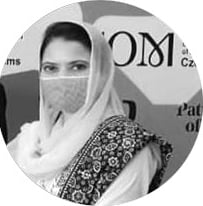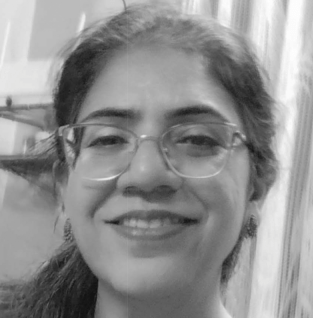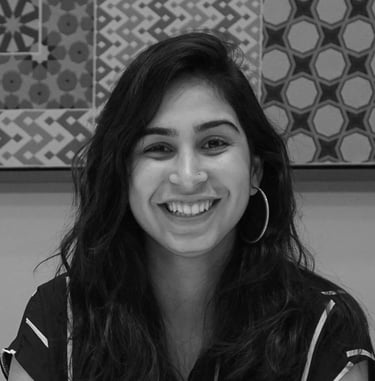Executive Committee
2023 - 2026
Usman Sami
Usman Sami is a Conservation Architect and is currently an Assistant Professor at the Department of Architecture at COMSATS University in Lahore.
He has previously taught at the National College of Arts, Lahore and was in charge of the NCA Archives. He worked at the Office for Conservation and Community Outreach as an Urban Analyst and at Imtiaz Ali Associates as an Associate Architect. He also received conservation training at SAYKA Architecture at Ankara.
Usman’s areas of interest are Conservation of Cultural Heritage, Heritage Management, British Colonial Architecture, the Industrial Arts & Crafts in the Punjab and the Lahore Museum. He has been researching and working with the Lahore Museum building for a decade. As a researcher, he has carried out an academic study on the building titled Understanding the Lahore Museum for the Definition of a Conservation Process. He prepared the Lahore Museum: Building Management Guidelines (2019) as part of the Lahore Museum Improvement Plan (2019) as a consulting National Expert for Heritage Conservation at UNESCO.
He earned his undergraduate degree in Architecture from the National College of Arts, Lahore, and his MSc. in Conservation of Cultural Heritage from Middle East Technical University, Ankara, Turkey. He is the co-founder and Principal of the architecture and heritage conservation firm Sami & Nakai at Lahore.
President


Zahida Quadri
Zahida Quadri is a historian and heritage professional currently serving as Assistant Director Excavation in the Culture, Tourism, Antiquities & Archives Department of the Government of Sindh. She has led critical projects at several UNESCO‑recognized Indus Valley civilizational sites, including Chanhu Jo Daro, where she heads the Pakistan excavation team working alongside French and UNESCO experts, and the "We Connect Makli" initiative designed to safeguard Makli, one of the world’s largest necropolises, through disaster preparedness and community participation.
Zahida is also a member of the International Committee for Regional Museums (ICR) within ICOM. She also serves as the editor of Sindh Antiquities, the bi‑annual scholarly journal published by her department.
Vice President


Dr. Masooma Shakir
Dr. Masooma Mohib Shakir is an architect, scholar, and educator at the Department of Architecture & Planning, NED University of Engineering & Technology in Karachi. She earned her Ph.D. from Bauhaus University in Germany and holds an M.Arch from KU Leuven, Belgium, alongside a B.Arch from IVSAA. As an academic, she contributes to both teaching and research.
Masooma’s research centers on cultural heritage, public space, and living shrines. In 2019, she authored her thesis—Reconstructing the Sufi Shrine as a Living Cultural Heritage—exploring the Shrine of Shah Abdul Latif Bhitai in Bhitshah, Pakistan. Her scholarly works include a 2022 chapter on Sindh’s Indus River heritage in the Routledge Handbook of Waterfront Cities and Urbanism, and 2023 articles such as “Morphology and land-use characteristics…” and “Context Integration and Inclusivity in Contemporary Public Spaces…” in respected journals.
In addition to her publications, she coordinated a UNESCO‑supported Faculty Development Workshop on studio pedagogies in October 2022, aimed at elevating architectural education across Sindh. Dr. Shakir also co-authored the monograph Karachi From the Prism of Urban Design (2016), advancing discourse around Karachi’s spatial fabric.
Through her combined roles—in teaching, research, publication, and professional service—Dr. Masooma Shakir has significantly advanced architectural scholarship and heritage conservation in Pakistan, particularly through her focus on public space integration and living cultural heritage.
Honorary Treasurer


Rameesha Yazdani
Rameesha Yazdani is a Lahore-based architect and interior designer having established her architectural firm, Atl&Co. She has also consulted for UNICEF, the British High Commission, the Federal Judicial Academy Pakistan, the Punjab Police, and various civil society organizations to bring thoughtful architectural practices and design to the human rights and development sphere. She holds a Bachelor of Architecture from the National College of Arts. Rameesha has developed an interest in architectural heritage through her work on projects such as the library and museum design for Gurdwara Nankana Sahib, and the redesign of Temple Valmiki. Her involvement with Lahore Sangat—an NGO committed to rediscovering the homes of key historical figures and bringing attention to lesser-known heritage sites—has further shaped her perspective on conservation practice. She hopes to continue contributing meaningfully to Pakistan’s heritage sector while supporting a collaborative and inclusive community for Heritage and Conservation Professionals.
Secretary


Shaheera Pesnani
Shaheera Pesnani is a heritage professional working at the intersection of communities, culture, and sustainable development. She has an MSc in Architectural Conservation from the University of Edinburgh, UK, where her research examined the impact of large-scale infrastructural development on built heritage and local communities in Gwadar, Pakistan, through the application of the Heritage Impact Assessment (HIA) framework. Prior to this, Shaheera completed a BSc (Hons) in Social Development and Policy at Habib University, Karachi, Pakistan, and a graduate programme in Islamic Studies and Humanities from the Institute of Ismaili Studies London, UK.
Currently, Shaheera is working at Historic England in York, UK. In addition, she is serving as a consultant for Leeds Industrial Museum’s forthcoming exhibition on industrial heritage. Shaheera represents ICOMOS Pakistan on the Emerging Professional Working Group and the Heritage and Gender Joint Task Team at ICOMOS International.
Emerging Professional Member


Fauzia H. Qureshi
Fauzia Husain Qureshi is a distinguished Pakistani architect, educator, and heritage professional. After earning her B.Arch with first-class honors and a gold medal from UET Lahore in 1975, she pursued an M.Arch at MIT in 1980, focusing on urban settlements in developing countries. Over a 40-year career, she served as Director and Principal Architect at Unicon Consulting and FHQ & Associates. She has worked on the master plans for Lahore Fort, and Shalimar Gardens.
A passionate educator, Fauzia spent over three decades teaching at the National College of Arts, Lahore, eventually retiring as Principal in 2011. Under her guidance, SOS Villages in Lahore, Multan, and Sialkot received architectural acclaim. She authored the authoritative Multan: A Spiritual Legacy (2014) and contributed chapters to several international publications, while also serving as President of ICOMOS Pakistan, advocating for heritage-centric policy and conservation best practices. Whether guiding UNESCO - aligned restoration efforts or mentoring emerging architects, Fauzia Qureshi remains a leading voice in Pakistan’s architectural and heritage conservation landscape.
Immediate Past President


